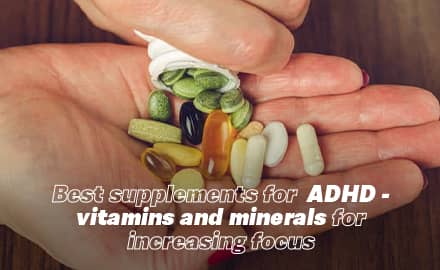
Attention-deficit/hyperactivity disorder (ADHD) is a neurodevelopmental disorder that affects children and adults. While medication and behavioral interventions are used to manage ADHD symptoms, certain vitamins and minerals play a supportive role. In this article, we will explore some of the best supplements for ADHD that have shown promising results in enhancing focus and cognitive function. It is important to note that these supplements should not replace prescribed medications or professional advice.
Omega-3 fatty acids, particularly eicosapentaenoic acid (EPA) and docosahexaenoic acid (DHA), are essential for brain health and function. Several studies have shown that omega-3 supplementation can improve attention and reduce hyperactivity in individuals with ADHD. These fatty acids are found in large quantities in fatty fish such as salmon, mackerel, and sardines. If dietary intake is insufficient, omega-3 supplements derived from fish oil or algae-based sources can be considered. Consultation with a healthcare professional helps to determine the appropriate dosage and ensure quality and purity.
Iron plays a crucial role in cognitive function and attention. Research suggests that iron deficiency may contribute to ADHD symptoms in some individuals. Adequate iron levels are necessary for producing dopamine, a neurotransmitter associated with attention and motivation. Iron-rich foods include red meat, poultry, beans, and fortified cereals. In cases where iron deficiency is confirmed through blood tests, iron supplementation under medical supervision may be recommended to restore optimal levels.
Zinc is an essential mineral in various brain functions, including neurotransmitter regulation. Studies have indicated that children with ADHD often have lower zinc levels in comparison to their peers. Zinc supplementation has shown the potential to improve attention and reduce hyperactivity. Foods rich in zinc include oysters, beef, pumpkin seeds, and fortified cereals. It is important to note that excessive zinc intake can lead to adverse effects, so consulting a healthcare professional to determine the appropriate dosage is advisable.
Vitamin B6 is involved in the production of neurotransmitters such as dopamine, serotonin, and gamma-aminobutyric acid (GABA), which play crucial roles in mood regulation and attention. Some studies have suggested that vitamin B6 supplementation may help alleviate ADHD symptoms, particularly in individuals with low levels of this vitamin. Good dietary sources of vitamin B6 include fish, poultry, potatoes, and bananas. Supplementation should be done under medical supervision to ensure proper dosage and avoid potential interactions with other medications.
Magnesium is essential for optimal brain function and plays a role in neurotransmitter regulation. Some studies have found a correlation between magnesium deficiency and ADHD symptoms. Supplementation with magnesium is known to improve attention and reduce hyperactivity. Dietary sources of magnesium include leafy green vegetables, nuts, seeds, and whole grains. Magnesium supplements can be considered, but it is vital to consult a healthcare professional to determine the appropriate dosage and avoid potential interactions with other medications.
While supplements provide additional support for individuals with ADHD, they should not replace evidence-based treatments or professional advice. Omega-3 fatty acids, iron, zinc, vitamin B6, and magnesium are among the supplements that have shown promise in improving focus and cognitive function. However, it is important to note that the effectiveness of these supplements may vary among individuals, and consultation with a healthcare professional is crucial to determine appropriate dosages and assess individual needs.